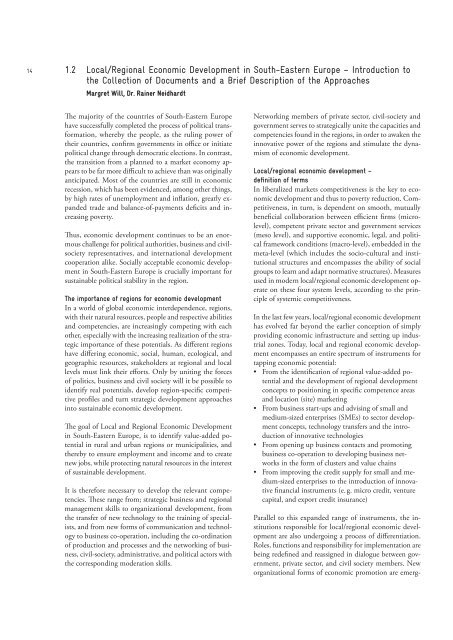Local/Regional Economic Development in South ... - Value Chains
Local/Regional Economic Development in South ... - Value Chains
Local/Regional Economic Development in South ... - Value Chains
You also want an ePaper? Increase the reach of your titles
YUMPU automatically turns print PDFs into web optimized ePapers that Google loves.
1<br />
1.2 <strong>Local</strong>/<strong>Regional</strong> <strong>Economic</strong> <strong>Development</strong> <strong>in</strong> <strong>South</strong>-Eastern Europe – Introduction to<br />
the Collection of Documents and a Brief Description of the Approaches<br />
Margret Will, Dr. Ra<strong>in</strong>er Neidhardt<br />
The majority of the countries of <strong>South</strong>-Eastern Europe<br />
have successfully completed the process of political transformation,<br />
whereby the people, as the rul<strong>in</strong>g power of<br />
their countries, confirm governments <strong>in</strong> office or <strong>in</strong>itiate<br />
political change through democratic elections. In contrast,<br />
the transition from a planned to a market economy appears<br />
to be far more difficult to achieve than was orig<strong>in</strong>ally<br />
anticipated. Most of the countries are still <strong>in</strong> economic<br />
recession, which has been evidenced, among other th<strong>in</strong>gs,<br />
by high rates of unemployment and <strong>in</strong>flation, greatly expanded<br />
trade and balance-of-payments deficits and <strong>in</strong>creas<strong>in</strong>g<br />
poverty.<br />
Thus, economic development cont<strong>in</strong>ues to be an enormous<br />
challenge for political authorities, bus<strong>in</strong>ess and civilsociety<br />
representatives, and <strong>in</strong>ternational development<br />
cooperation alike. Socially acceptable economic development<br />
<strong>in</strong> <strong>South</strong>-Eastern Europe is crucially important for<br />
susta<strong>in</strong>able political stability <strong>in</strong> the region.<br />
The importance of regions for economic development<br />
In a world of global economic <strong>in</strong>terdependence, regions,<br />
with their natural resources, people and respective abilities<br />
and competencies, are <strong>in</strong>creas<strong>in</strong>gly compet<strong>in</strong>g with each<br />
other, especially with the <strong>in</strong>creas<strong>in</strong>g realization of the strategic<br />
importance of these potentials. As different regions<br />
have differ<strong>in</strong>g economic, social, human, ecological, and<br />
geographic resources, stakeholders at regional and local<br />
levels must l<strong>in</strong>k their efforts. Only by unit<strong>in</strong>g the forces<br />
of politics, bus<strong>in</strong>ess and civil society will it be possible to<br />
identify real potentials, develop region-specific competitive<br />
profiles and turn strategic development approaches<br />
<strong>in</strong>to susta<strong>in</strong>able economic development.<br />
The goal of <strong>Local</strong> and <strong>Regional</strong> <strong>Economic</strong> <strong>Development</strong><br />
<strong>in</strong> <strong>South</strong>-Eastern Europe, is to identify value-added potential<br />
<strong>in</strong> rural and urban regions or municipalities, and<br />
thereby to ensure employment and <strong>in</strong>come and to create<br />
new jobs, while protect<strong>in</strong>g natural resources <strong>in</strong> the <strong>in</strong>terest<br />
of susta<strong>in</strong>able development.<br />
It is therefore necessary to develop the relevant competencies.<br />
These range from; strategic bus<strong>in</strong>ess and regional<br />
management skills to organizational development, from<br />
the transfer of new technology to the tra<strong>in</strong><strong>in</strong>g of specialists,<br />
and from new forms of communication and technology<br />
to bus<strong>in</strong>ess co-operation, <strong>in</strong>clud<strong>in</strong>g the co-ord<strong>in</strong>ation<br />
of production and processes and the network<strong>in</strong>g of bus<strong>in</strong>ess,<br />
civil-society, adm<strong>in</strong>istrative, and political actors with<br />
the correspond<strong>in</strong>g moderation skills.<br />
Network<strong>in</strong>g members of private sector, civil-society and<br />
government serves to strategically unite the capacities and<br />
competencies found <strong>in</strong> the regions, <strong>in</strong> order to awaken the<br />
<strong>in</strong>novative power of the regions and stimulate the dynamism<br />
of economic development.<br />
<strong>Local</strong>/regional economic development –<br />
def<strong>in</strong>ition of terms<br />
In liberalized markets competitiveness is the key to economic<br />
development and thus to poverty reduction. Competitiveness,<br />
<strong>in</strong> turn, is dependent on smooth, mutually<br />
beneficial collaboration between efficient firms (microlevel),<br />
competent private sector and government services<br />
(meso level), and supportive economic, legal, and political<br />
framework conditions (macro-level), embedded <strong>in</strong> the<br />
meta-level (which <strong>in</strong>cludes the socio-cultural and <strong>in</strong>stitutional<br />
structures and encompasses the ability of social<br />
groups to learn and adapt normative structures). Measures<br />
used <strong>in</strong> modern local/regional economic development operate<br />
on these four system levels, accord<strong>in</strong>g to the pr<strong>in</strong>ciple<br />
of systemic competitiveness.<br />
In the last few years, local/regional economic development<br />
has evolved far beyond the earlier conception of simply<br />
provid<strong>in</strong>g economic <strong>in</strong>frastructure and sett<strong>in</strong>g up <strong>in</strong>dustrial<br />
zones. Today, local and regional economic development<br />
encompasses an entire spectrum of <strong>in</strong>struments for<br />
tapp<strong>in</strong>g economic potential:<br />
• From the identification of regional value-added potential<br />
and the development of regional development<br />
concepts to position<strong>in</strong>g <strong>in</strong> specific competence areas<br />
and location (site) market<strong>in</strong>g<br />
• From bus<strong>in</strong>ess start-ups and advis<strong>in</strong>g of small and<br />
medium-sized enterprises (SMEs) to sector development<br />
concepts, technology transfers and the <strong>in</strong>troduction<br />
of <strong>in</strong>novative technologies<br />
• From open<strong>in</strong>g up bus<strong>in</strong>ess contacts and promot<strong>in</strong>g<br />
bus<strong>in</strong>ess co-operation to develop<strong>in</strong>g bus<strong>in</strong>ess networks<br />
<strong>in</strong> the form of clusters and value cha<strong>in</strong>s<br />
• From improv<strong>in</strong>g the credit supply for small and medium-sized<br />
enterprises to the <strong>in</strong>troduction of <strong>in</strong>novative<br />
f<strong>in</strong>ancial <strong>in</strong>struments (e. g. micro credit, venture<br />
capital, and export credit <strong>in</strong>surance)<br />
Parallel to this expanded range of <strong>in</strong>struments, the <strong>in</strong>stitutions<br />
responsible for local/regional economic development<br />
are also undergo<strong>in</strong>g a process of differentiation.<br />
Roles, functions and responsibility for implementation are<br />
be<strong>in</strong>g redef<strong>in</strong>ed and reassigned <strong>in</strong> dialogue between government,<br />
private sector, and civil society members. New<br />
organizational forms of economic promotion are emerg-



